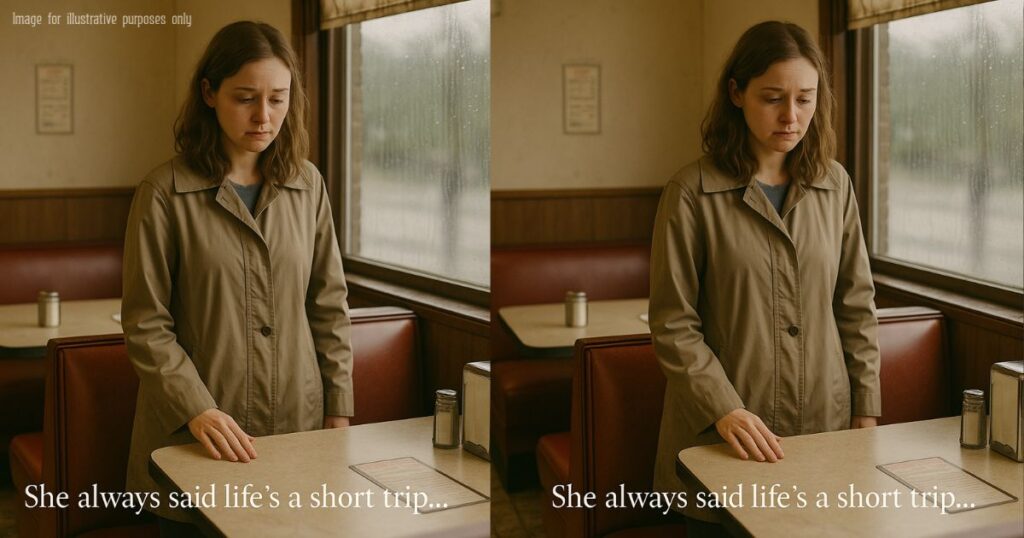“Read the letter,” Maddy said, gently.
I unfolded the pages. The ink was slightly smudged, probably from tears, coffee, or both.
Dear Ray,
If you’re reading this, I’m gone.
Don’t feel bad. I had a good run. I raised a kind daughter, ate pancakes every Sunday, and I laughed more than I cried.
I’m leaving this for you because Dot’s Diner was the only place I ever felt truly seen. You treated me and my little girl like royalty when we didn’t have a dime to spare. You never judged me for paying in change, for ordering water, for letting Maddy talk your ear off. You made us feel like we mattered.
And that matters more than you’ll ever know.
This money isn’t much, but it’s what I could save. I want you to do something with it. Keep Dot’s open. Fix the jukebox. Add real strawberries instead of syrup from a can.
And when a single mom comes in, dead on her feet, looking for peace—give her coffee on the house.
Because kindness doesn’t go out of style.
Thank you, Ray. For seeing me.
Love,
Janie
I looked up, my throat full of glass.
Maddy was crying now, quietly, like someone who’d cried too much to stop. I reached across the table and put my hand over hers. Hers was cold. Mine was shaking.
“I didn’t know,” I whispered.
“She didn’t want anyone to,” Maddy replied. “She was always more about other people’s comfort than her own.”
I folded the letter carefully and slid it back into the envelope. I didn’t know what to say. No words were big enough.
So I stood.
Walked to the jukebox.
And for the first time in years, I dropped a coin in.
It sputtered. Then groaned. Then—by some miracle—“Blue Skies” by Willie Nelson crackled to life.
Maddy laughed through her tears.
“Still works,” she said.
“Not well,” I replied. “But I guess that’s most of us now.”
I brought two slices of pie to the table—lemon meringue, her mom’s favorite—and sat back down.
“I’m gonna fix the place up,” I told her. “Add her name to the menu. ‘Janie’s Sunday Stack.’ Real strawberries, extra whipped cream.”
“She’d like that.”
“She’d haunt me if I didn’t.”
We ate pie. The rain kept falling. A man came in for coffee and waved without asking for a menu. Two teenagers walked by the window, laughing in the drizzle. Somewhere in the back, the coffee machine hissed like it had something to say.
And for a moment, I remembered what it felt like to matter.
Three Months Later
Dot’s was different now.
Not shiny or fancy. Still had the same cracked tiles, same squeaky bench at Table Three. But the jukebox worked. The strawberries were fresh. And above the register, framed in oak, was Janie’s letter—tucked behind glass where the sun hit it every morning at 9:07.
Maddy came in most Sundays now. Not every week, but enough. She always sat at Table Seven. Sometimes alone, sometimes with a friend, once with a man who looked nervous and held her hand like it was breakable.
I never asked questions.
I just brought the pancakes.
The check never came.
And every time she left, she’d pause by the booth, fingers brushing the edge of the vinyl. Like her mama was still there. Like the booth remembered.
Maybe it did.
Booths are funny that way.
One Year Later
It was a Sunday. Easter morning. Bright and crisp, like someone had cleaned the sky.
Maddy came in with a little girl in a pink coat. Couldn’t have been more than five. Curly hair. Big eyes. The kind of quiet curiosity that reminded me of someone.
They slid into Table Seven.
And I heard it—clear as day—when the little girl said:
“Who’s the lady in the picture?”
Maddy touched the glass frame on the wall and smiled.
“That’s your grandma,” she said. “She used to bring me here.”
The girl looked around. “This place is old.”
Maddy nodded. “The best things are.”
Then she leaned across the table and whispered something to her daughter. I didn’t catch it all, but I heard the last line as plain as the church bells down the street:
“Life’s a short trip, honey—order the syrup.”
And just like that, the booth felt full again.
Like it always had.


